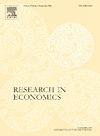Interdependent cyber risk and the role of insurers
IF 1.2
Q3 ECONOMICS
引用次数: 0
Abstract
Increasing use of new digital services offers tremendous opportunities for modern society, but also entails new risks. One tool for managing cyber risk is cyber insurance. While cyber insurance has attracted much attention and optimism, interdependent cyber risks and lack of actuarial data have prompted some insurers to adopt a more proactive role, not only insuring losses but also assisting clients with preventive work such as managed detection and response solutions, i.e., investments in their own cybersecurity. The purpose of this paper is to propose and theoretically investigate yet a further extension of this role, where insurers facilitate security investments between interdependent firms, which get the opportunity to invest a share of their insurance premiums to improve the security of each other. It is demonstrated that if insurers can facilitate such investments, then under common theoretical assumptions this can make a positive contribution to overall welfare. The paper is concluded by a discussion of the relevance and applicability of this theoretical contribution in practice.
相互依赖的网络风险和保险公司的角色
越来越多地使用新的数字服务为现代社会提供了巨大的机会,但也带来了新的风险。管理网络风险的一个工具是网络保险。尽管网络保险备受关注和乐观,但相互依存的网络风险和精算数据的缺乏促使一些保险公司采取更积极的角色,不仅为损失提供保险,还协助客户开展预防性工作,如管理检测和响应解决方案,即投资于自己的网络安全。本文的目的是提出并从理论上研究这一角色的进一步扩展,其中保险公司促进相互依赖的公司之间的证券投资,这些公司有机会投资一部分保费以提高彼此的安全性。如果保险公司能够促进这种投资,那么在共同的理论假设下,这可以对整体福利做出积极贡献。本文最后讨论了这一理论贡献在实践中的相关性和适用性。
本文章由计算机程序翻译,如有差异,请以英文原文为准。
求助全文
约1分钟内获得全文
求助全文
来源期刊

Research in Economics
ECONOMICS-
CiteScore
1.40
自引率
0.00%
发文量
37
审稿时长
89 days
期刊介绍:
Established in 1947, Research in Economics is one of the oldest general-interest economics journals in the world and the main one among those based in Italy. The purpose of the journal is to select original theoretical and empirical articles that will have high impact on the debate in the social sciences; since 1947, it has published important research contributions on a wide range of topics. A summary of our editorial policy is this: the editors make a preliminary assessment of whether the results of a paper, if correct, are worth publishing. If so one of the associate editors reviews the paper: from the reviewer we expect to learn if the paper is understandable and coherent and - within reasonable bounds - the results are correct. We believe that long lags in publication and multiple demands for revision simply slow scientific progress. Our goal is to provide you a definitive answer within one month of submission. We give the editors one week to judge the overall contribution and if acceptable send your paper to an associate editor. We expect the associate editor to provide a more detailed evaluation within three weeks so that the editors can make a final decision before the month expires. In the (rare) case of a revision we allow four months and in the case of conditional acceptance we allow two months to submit the final version. In both cases we expect a cover letter explaining how you met the requirements. For conditional acceptance the editors will verify that the requirements were met. In the case of revision the original associate editor will do so. If the revision cannot be at least conditionally accepted it is rejected: there is no second revision.
 求助内容:
求助内容: 应助结果提醒方式:
应助结果提醒方式:


